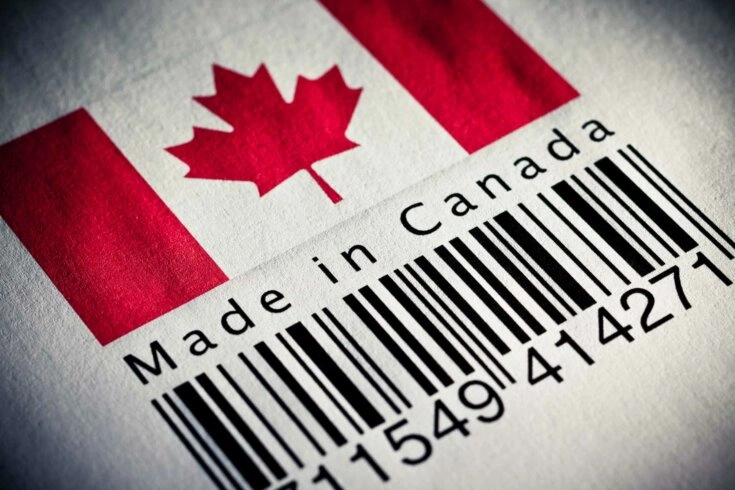 iStock
iStock T he rise in nationalist sentiment since Donald Trumps second inauguration has been extraordinary. Flags fly higher. Political speeches lean harder into Canadian values.
Nationalism is inherently interesting. There are varieties: left, right, civic, ethnic. There are different, competing definitions. There are benign, if cloying, manifestations and malignant ones. As a sentiment and a commitment, its important to examine and understand nationalism since its also a kind of currency that can be spent, or a force that can be mobilized, and not necessarily for good. Indeed, nationalism is often mobilized to no small destructive end. Some argue nationalism is inherently bad or, at least, suspect. And right now, Canada is lousy with the stuffand advertisements looking to capitalize on it.
I watched a lot of hockey lately. That means Ive seen a ton of ads. Ive noticed an uptick in nationalism-inspired commercials and other ads: Tim Hortons (naturally), Quaker Oats, and Pizza Pizza stood out to me. Each was keen to highlight some bit of Canada: its hallmarks, its tropes, its institutions, whatever. On the boards of the rink during game three of the ChargeFrost final, in Minnesota, the TSN broadcast featured digital ads highlighting how Pizza Pizza was Actually Canadian. I guess as opposed to being figuratively Canadian? We ordered sandwiches.
The free markets embrace ofor increased enthusiasm forCanadian nationalism is itself an interesting phenomenon insofar as it represents the commodification of sentiment that may have both economic and political effects. This isnt a new practice. But the speed and scale of it has been remarkable, both online and offline. The sheer gall of the advertisers in some instances, like foreign multinationals hopping on the bandwagon, has been entertainingif thats the right word. The broader economic effect is also fascinating, as consumer sentiment is taking shape and being captured. Some entertainment companies, such as Corus, are even seeing a possible revenue increase from the trend.
One immediate takeaway from the nationalist ad blitz is that just about anything can be hijacked and commodified for profit in a market systemand therefore will be, under the right conditions. If the phenomenon is heavily laden with emotion, all the better for the advertisers. Were all chasing, and buying, a feeling, right? And people love to feel that theyre part of something, including a crowd, or, better yet, a movement. Buying 100 percent Canadian pizza is a patriotic act!
I dont inherently hate ads, not reflexively at least, as some do. I hate being constantly bombarded with them when Im out to watch a movie or a hockey game, but my irritation is less a function of their being ads and more one of their being so many of them. In the case of ads capitalizing on nationalist sentiment, Im more curious: Do they work? At scale? Do consumers interrogate, at all, the complexities of these companies trying to manipulate them or sell them a saccharine sense of belonging, especially if theyre foreign, even American, companies? Is that not at least a little bit funny?
The rise of nationalism-inspired ads also reflects a struggle over who gets a piece of this moment, to what end, and in what form. Companies trying to make a buck off flag wavers and other mobilizations of nationalism arent mutually exclusive, but their specific constructions of Canada may be at odds with other, especially more critical, iterations. No company is running feel-good ads on hallway medicine, for instance. No company is trying to remind you that millions of flag-waving, pepperoni-loving good ol folks are one or two paycheques away from destitution. No company is trying to induce a warm, fuzzy feeling by saying their local chain coffee outlet is on unceded Indigenous land. Those would be pretty ineffective ads.
Differing conceptions or mobilizations of Canadian nationalism may not be zero sum as such, but they could be as they compete for our attention and our understanding of what Canada is, what it means, how it works, and what we should do about it. If we believe in the Norman Rockwell North (who would that be?) version of Canada fed to us by a coffee chain, does that make us less willing to recognize and address our serious and persistent shortcomings as a country? If Ive ordered my 100 percent actually Canadian pizza, is that enough? What else do you expect me to do?
The danger of flattening nationalism and making it a branding project is that it risks displacing the political project. Nationalism as a marketing campaign is far preferable to a chauvinistic ethnic project of exclusionary politics and apologia for the state and its undertakings. But the former also reduces citizenship in a national civic community to displays of consumption, a country as a vehicle for product placement. Perhaps more to the point, those arent our only options. We could choose a civic nationalism centred on justice and egalitarianism, a communal commitment to venerating care for one another at scale. It wouldnt fit on a billboard, but it wouldnt have to.
Adapted from Who Owns Canadian Nationalism? by David Moscrop (Substack). Reprinted with permission of the author.
Canadas homegrown journalismglorious and paywall-freeThis Canada Day comes at a time when many of us are thinking about what the future might hold for the country. The Walrus has always looked at answering the bigger, national questionsbut we are increasingly looking at how the urgent topics of the day are playing out on a community level, whether you are a newcomer in Montreal, an elder in the Yukon, or a multi-generational Maritimer. This range of perspectives helps create a stronger foundation for understanding who we are from coast to coast to coast. If you enjoy fact-based, homegrown, and independent journalism at The Walrus, please make a contribution today. Your support helps our small and dedicated team who believe in starting Canadas most compelling conversations. Thank you for your support. Monika Warzecha
Digital Editor, The Walrus


